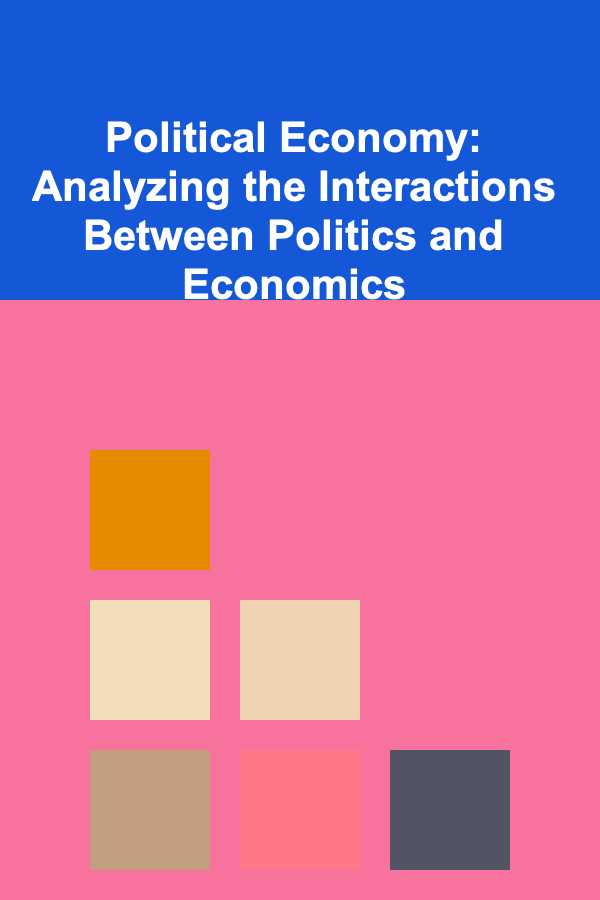
Political Economy: Analyzing the Interactions Between Politics and Economics
ebook include PDF & Audio bundle (Micro Guide)
$12.99$10.99
Limited Time Offer! Order within the next:

Political economy is a dynamic and interdisciplinary field of study that seeks to understand the complex and often reciprocal relationships between politics and economics. It bridges the gap between economic theories and political ideologies, investigating how political institutions, power dynamics, and government policies influence economic outcomes, and vice versa. This actionable guide delves into the foundational aspects of political economy, offering a deeper understanding of its principles, frameworks, and real-world applications.
Defining Political Economy
Political economy, at its core, is the study of how political forces shape economic systems and how economic structures influence political outcomes. It merges insights from both economics and political science, allowing scholars and practitioners to explore issues like wealth distribution, government intervention, the role of international institutions, and the economic impact of political decisions.
Political economy asks questions such as:
- How do governments shape economic policies?
- What role does power play in the allocation of resources?
- How do market structures influence political behavior?
- How do economic crises affect political stability?
The field is often divided into different approaches:
- Classical Political Economy: Focuses on the role of free markets and minimal government interference, drawing heavily from thinkers like Adam Smith and David Ricardo.
- Marxist Political Economy: Analyzes how capitalism and the relations of production affect class structures and economic systems, as theorized by Karl Marx.
- Neoliberalism: Emphasizes market-oriented policies and the belief that economic efficiency can be achieved by reducing government intervention in the market.
- Institutional Economics: Studies how institutions, both formal (laws, regulations) and informal (cultural norms, traditions), influence economic outcomes and political behavior.
The Role of Government in the Political Economy
One of the central themes in political economy is the role of government in shaping economic outcomes. Governments intervene in the economy in various ways, either through regulation, taxation, public spending, or monetary policy. The extent and nature of this intervention depend on the political ideologies in power and the broader societal context.
2.1 Government Regulation and Market Failures
In capitalist economies, free markets are believed to allocate resources efficiently. However, market failures can occur, where markets fail to produce optimal outcomes. Governments often step in to correct these failures by regulating industries, enforcing anti-trust laws, and providing public goods like infrastructure and education.
For example, environmental regulation is a common intervention in many economies, aimed at correcting the negative externalities produced by industries (e.g., pollution). Without government intervention, businesses might prioritize profit maximization at the expense of the environment and public health.
2.2 Taxation and Redistribution
Governments also play a crucial role in redistributing wealth. Through progressive taxation and welfare policies, governments aim to reduce income inequality and provide public services such as healthcare, education, and social security.
The economic theories that guide tax policies are often influenced by political ideologies. For instance, a liberal political economy may prioritize welfare policies to reduce inequality, whereas a conservative political economy might argue for lower taxes to stimulate economic growth and individual responsibility.
2.3 Monetary and Fiscal Policy
Another key function of the government in political economy is the formulation of monetary and fiscal policies. Monetary policy, typically administered by central banks, involves managing the money supply and interest rates to control inflation and stabilize the economy. Fiscal policy, on the other hand, involves government spending and taxation decisions to influence the economic cycle.
In times of economic crisis, such as a recession, governments may adopt expansive fiscal and monetary policies (e.g., stimulus spending or lower interest rates) to stimulate demand and encourage investment. Conversely, in times of inflation, contractionary policies might be used to cool the economy.
The Influence of Political Institutions on Economic Systems
Political institutions, including the structure of the state, the distribution of power, and the electoral system, profoundly influence economic systems. Political decisions, such as the formulation of property rights, legal frameworks, and the protection of contracts, shape the functioning of markets.
3.1 Democracy vs. Autocracy
The political system under which a country operates can have a significant impact on its economic outcomes. In democratic systems, the political economy tends to reflect the preferences of the electorate, which can lead to policies that address the needs of the broader population, such as welfare programs and social safety nets. However, democratic governments may also face challenges in achieving long-term economic goals due to short-term electoral pressures.
In contrast, autocratic regimes may be able to implement long-term economic policies without the constraints of electoral cycles. However, they may also suffer from inefficiencies, corruption, and a lack of accountability, which can undermine economic growth in the long run.
3.2 Rule of Law and Property Rights
Political institutions also influence economic outcomes by defining and enforcing property rights. The establishment of clear property rights allows individuals and businesses to engage in trade, invest, and innovate, knowing that their property is protected by law. In countries where the rule of law is weak or property rights are unclear, economic growth can be stunted due to a lack of trust and legal certainty.
The political economy of a country is deeply tied to its legal institutions, which determine how disputes are resolved and how contracts are enforced. A well-functioning legal system that upholds property rights fosters a stable and predictable environment for economic activities.
The Political Economy of Globalization
Globalization has become a central focus of political economy due to its profound impact on both national and global economic systems. The increasing interconnectedness of economies through trade, investment, and technology has created new challenges and opportunities for governments and businesses alike.
4.1 Trade and Economic Integration
Global trade has been one of the most significant drivers of economic growth over the past century. Through trade liberalization, countries have gained access to foreign markets, reduced prices for consumers, and benefited from the specialization of production. Political decisions regarding trade policy, tariffs, and international agreements can shape the flow of goods, services, and capital between nations.
However, globalization also brings about challenges such as increased competition, job displacement, and income inequality. Some political economies argue that international trade can lead to a "race to the bottom," where countries reduce labor and environmental standards to attract foreign investment. Others advocate for protectionist policies to safeguard domestic industries and employment.
4.2 Financial Globalization and Economic Crises
The rapid expansion of global financial markets has interconnected economies and increased the flow of capital across borders. However, financial globalization has also led to increased vulnerability to financial crises, as seen in the 2008 global financial crisis. Political institutions play a key role in regulating financial markets and ensuring the stability of the financial system.
In the aftermath of a financial crisis, governments are often forced to intervene in the economy through bailouts, fiscal stimulus, and regulatory reforms. The political economy of economic crises involves balancing the interests of different groups, including the financial sector, consumers, and taxpayers.
The Role of Ideology in Shaping Political Economy
Political economy is deeply influenced by ideologies, which shape the policies governments pursue and how they engage with markets. Different political ideologies prioritize different economic goals and believe in varying levels of government intervention.
5.1 Capitalism vs. Socialism
Capitalism and socialism represent two extremes in political economy. Capitalism emphasizes individual freedom, market competition, and limited government intervention, while socialism advocates for collective ownership of resources and government control over the means of production. The balance between these two systems often shapes the political economy of a country, with capitalist economies generally favoring free-market policies and socialist economies leaning toward central planning and redistribution.
5.2 Neoliberalism
Neoliberalism, which emerged in the late 20th century, advocates for reducing government intervention in the economy, deregulation, and privatization of public services. Proponents of neoliberal policies argue that free markets are the most efficient way to allocate resources, while critics argue that neoliberalism exacerbates inequality and undermines public welfare.
Conclusion: The Interconnectedness of Politics and Economics
Political economy is a rich and complex field that highlights the interdependence between politics and economics. Understanding how political decisions shape economic systems---and how economic conditions influence political behavior---can help policymakers, businesses, and citizens navigate the challenges of the modern world. Whether addressing inequality, environmental sustainability, or the impact of globalization, political economy offers valuable insights into the functioning of both national and global systems.
By studying political economy, we gain a deeper understanding of how power, resources, and ideologies interact to shape the world we live in. Ultimately, the future of political economy will depend on the ability of societies to find a balance between political freedoms, economic efficiency, and social equity.

How to Build a Checklist for Checking Website Functionality
Read More
How to Clean Your Home Efficiently Using the "Room-by-Room" Method
Read More
How to Create Attractive Listings for Used Books on eBay
Read More
How to Teach Kids the Basics of Budgeting and Money Management
Read More
How to Use Smart Lighting to Enhance Your Home's Style
Read More
Monetizing Deep Learning: A Guide to Earning Passive Income Online
Read MoreOther Products

How to Build a Checklist for Checking Website Functionality
Read More
How to Clean Your Home Efficiently Using the "Room-by-Room" Method
Read More
How to Create Attractive Listings for Used Books on eBay
Read More
How to Teach Kids the Basics of Budgeting and Money Management
Read More
How to Use Smart Lighting to Enhance Your Home's Style
Read More